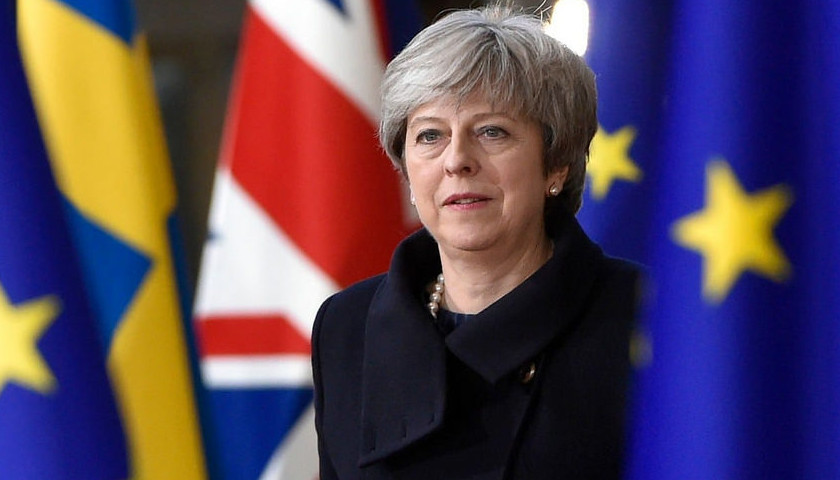Veteran Conservative lawmaker Nigel Evans has been in Britain’s House of Commons for more than a quarter-of-a-century and, like most of his parliamentary colleagues, is stunned at the turn of Brexit events.
“I got elected in 1992 and I don’t know if I have known any time more uncertain than now,” he told VOA.
He’s flummoxed at what the next move should be for a Conservative government that has lost control of the Brexit process.
As a committed Brexiter, he fears Britain will end up staying in the European Union because of an impasse in the Commons that has seen the ruling Conservative government repeatedly rebuffed by lawmakers, including by a third of its own MPs, in a series of historic votes without precedent for the storied House of Commons.
Parliament is not alone in being hopelessly divided: Theresa May’s Cabinet is, too, with the British prime minister lurching between pro-EU rebel ministers and their pro-Brexit counterparts, trying to resuscitate a government that appears to be in terminal decline.
Divorce delayed
More than 20 ministers have resigned in the past two years — and at least another half-dozen are on the cusp of quitting. Midweek another minister resigned and four declined to vote with their own government — an unprecedented defiance left unpunished.
Britain’s newspaper headline writers are running out of superlatives and metaphors to describe the political havoc. “We’re becoming the laughing stock of the World,” fumes Andrew Pierce, the Daily Mail’s associate editor, in College Green, the patch of grass outside parliament which has become a media encampment of tents, wires and cameras besieged by chanting, dueling placard-waving protesters.
Britain was due to exit the EU in 16 days’ time, on March 29.
On Wednesday, the House of Commons voted against Britain exiting the EU without a deal — in effect delaying Brexit until further notice. That followed Tuesday’s crushing parliamentary defeat of Theresa May’s Brexit withdrawal agreement — the second time pro-EU and hardline pro-Brexit lawmakers have combined to reject it. Lawmakers Thursday are expected to pass a measure seeking formally to delay Brexit, at least to June 30. EU leaders are divided about accepting a request for delay.
Donald Tusk, the president of the EU Council, tweeted Thursday: “I will appeal to the EU27 to be open to a long extension if the UK finds it necessary to rethink its #Brexit strategy and build consensus around it.”
The Remainers hope to either block Brexit altogether or at least steer it in a gentler direction with Britain still closely aligned although not a member of its political institutions. Hardline Brexiters want a no-nonsense sharp break with the EU, ready to accept the economic damage to Britain that will wreak, at least in the medium term.
That Evans feels unable to predict what happens next is instructive. He is no junior lawmaker, but a so-called “Tory grandee”, and he helps to direct the 1922 Committee, of which all backbench Conservative lawmakers are members.
When the bosses of the 1922 Committee tell a Conservative leader to quit, their word has the force of the Lord High Executioner. The last time the 22, as its nicknamed, deposed a party leader was in 2003, ousting one of Theresa May’s predecessors for losing a general election.
Are they close to giving May the push now? Evans is guarded but makes little secret he thinks the time is close at hand. “Her authority is greatly weakened,” he says grimly.
Replacing May
Pro-Brexit Conservative bloggers and columnists are in vituperative mood, blaming May for mishandling the negotiations with the EU and, from their viewpoint, giving too much ground to Brussels. Gridlock has been the result, they say.
“I can see no scenario where she is the answer for taking the country forward. She should by rights go now. At some point in the next two or three weeks it will even dawn on Mrs. May that it is time to go,” Conservative blogger Iain Dale tells VOA.
Then what?
The vultures are circling. Half-a-dozen would-be replacements from inside May’s Cabinet have in effect been auditioning already for the job, delivering speeches carving out their vision for the country. Some contenders have advanced plans, including printing up campaign material for what they expect is an inevitable leadership election.
A Conservative grassroots favorite, Boris Johnson, the former foreign minister, has had a modern makeover and dispensed with his trademark tousle-haired slapdash look and is now sporting a stylish boyband haircut.
But it is not clear that replacing Theresa May will solve anything or break the political impasse, which is why the 1922 Committee has stayed its hand.
There is no obvious unity candidate to succeed her. A new leader will face the same splits inside the Conservative party between Remainers, Brexiters and the those who favor a so-called soft Brexit modeled on Norway’s relationship with the EU, which would see Britain remain in the bloc’s single market and customs union as well as accept freedom of movement.
– – –
Photo “Theresa May” by Tiocfaidh ár lá 1916. CC BY-ND 2.0.




